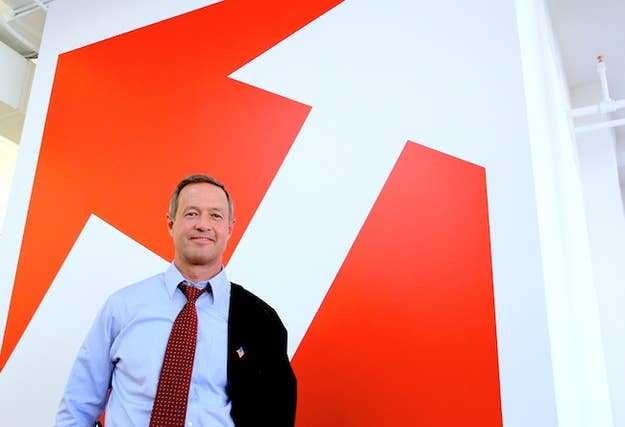
Maryland governor Martin O'Malley told BuzzFeed that Democrats will win in 2012 by energizing their base, not by trying to persuade elusive swing voters.
O'Malley, a top Obama ally who chairs the the Democratic Governors Association and is often named as a possible presidential contender in 2016, discounted the idea that whoever wins the presidential election will be the candidate who focuses most closely on independent voters. And he suggested that the Democratic National Convention marked a decision to run a campaign centered on core Democratic voters — traditionally, younger, more liberal, African-American and Hispanic.
"Sometimes in campaigns you can drive yourself crazy with the micro-targeting and the pollsters and the tea leaves and the pixie dust trying to twist yourself into triple back-flips to appeal to the three percent that are the undecideds that live in suburbs and have lawns that are less than 20 feet long and all that bullshit," O'Malley said in an interview at BuzzFeed's Manhattan office Thursday. "Just tell the base why you're doing what you're doing and why you're better than the other guy."
O'Malley made the case that undecided voters are simply too diverse to be effectively targeted by a candidate or campaign.
"I believe that if the base — as large as it is now — understands the progress that we've been making and can articulate the better choices that we are making compared to what Romney would do, then they'll go out and find us the additional four or five points we need to win this race," O'Malley said. "And I think that's the dynamic that's happening here."
The debate over running toward the base or toward independents is a long one in American politics, and was most pronounced in Republican Party circles during the administration of George W. Bush. Bush's top political adviser, Karl Rove, argued for a strategy of energizing the base rather than, as Bush's father had done, taking conservative votes for granted and reaching for the center; the younger Bush won both of his national elections.
O'Malley rejected the comparison to Rove, but counseled what is in some ways a similar approach.
"But I do think that after scratching our heads and trying to find the magic argument for the three percent that are undecided, we've come off of a very good convention where we spoke to an enthusiastic base," he said.
While the Republican National Convention last month downplayed conservative policy and personalities in favor of a broad, centrist appeal, the Democrats' convention — in which O'Malley played a prominent role — focused on appealing to liberals. Speakers on the convention stage, including some those scheduled during prime time broadcast television hours, didn't shy away from hot-button topics like birth control and gay marriage.
Much of the convention seemed designed to appeal to women, a constituency among whom the Democrats find more support than the Republicans. But O'Malley conceded that there aren't many women in the upper ranks of Democratic governance: only two female governors in the country are Democrats, and neither of them plan to seek re-election.
"They actually do have a more diverse group of governors than we do," he acknowledged, calling the Republican governors' greater ethnic and gender diversity a "demographic anomaly."
"That's a bit of an anomaly, especially when you consider part of their playbook is to roll back women's rights, roll back voting rights, roll back worker's rights," he said, adding a cheer for the strongest female Democratic candidate for governor this cycle, in New Hampshire: "Come on Maggie Hassan!"

